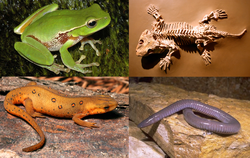amfībija
Appearance
Latvian
[edit]

Etymology
[edit]Via other European languages, ultimately borrowed from Ancient Greek ἀμφίβιον (amphíbion), from ἀμφί (amphí, “of both kinds”) and βίος (bíos, “life”).
Pronunciation
[edit]Noun
[edit]amfībija f (4th declension)
- amphibian (vertebrates of the class Amphibia that live both on land and in water)
- augstākajiem mugurkaulniekiem audu atjaunošanās spējas nebūt nav zemākas, bet dažos gadījumos pat augstākas nekā zemākajiem mugurkaulniekiem - amfībijām ― the higher vertebrates have a not insignificant skin regeneration capacity, and in some cases even higher than that of lower verbetrates: the amphibians
- amphibian (a vehicle, car or tank, that can move both on land and in water; an airplane that can land on water)
- ap tilta celtniecības zonu zibens ātrumā riņķo amfībijas ― amphibians were circling with lightning speed around the bridge construction zone
- lidmašīna amfībija, lidojot nelielā augstumā, skaidrā bezvēja dienā var ievērot [brētliņu] baru ― an amphibious aircraft, flying at low height, in a good, windless day, can observe even a school of sprat (= small herring-like fish)
Usage notes
[edit]In the biological sense (Amphibia), abinieks is the usual term. In non-biological senses ('amphibian tank'), however, only amfībija is possible.
Declension
[edit]| singular | plural | |
|---|---|---|
| nominative | amfībija | amfībijas |
| genitive | amfībijas | amfībiju |
| dative | amfībijai | amfībijām |
| accusative | amfībiju | amfībijas |
| instrumental | amfībiju | amfībijām |
| locative | amfībijā | amfībijās |
| vocative | amfībija | amfībijas |

